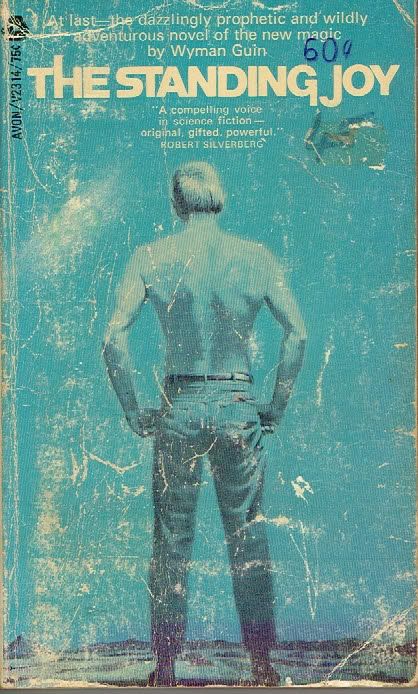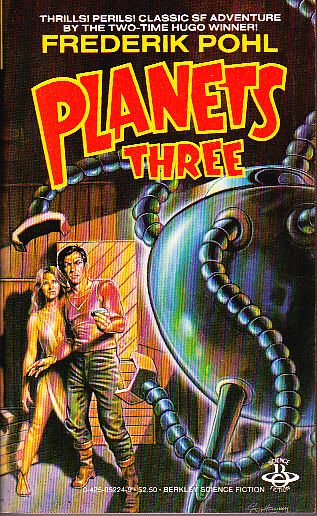Ok, so I've read several more of Varley's short stories from
The John Varley Reader and they've all been very good. I also listened to a podcast of another from
Starship Sofa called "The Bagetelle" which I liked too. I haven't even gotten to "The Persistence of Vision", "Air Raid" or "PRESS ENTER", arguably his three most famous.
Ironically, I'm not that big a fan of "PE". "Air Raid" was turned into what I recall as being a really bad novel (and probably worse movie) but is a good story. And "POV" is
really good.
The publisher has this to say about Varley:
His first collection, The Persistence of Vision, published in 1978, was the most important collection of the decade, and changed what fans would come to expect from science fiction.
That's quite an endorsement.
Yep - it's certainly among them, but a lot of great collections came out in the 70s - when you have Tiptree, Zelazny, Spinrad, Silverberg, Pohl, Le Guin, Ellison, Budrys, etc., and many of the Golden Age masters still kicking, any "the" most anything has to be hyperbole.
Speaking of 70s collections (sort of) - I just finished
The Worlds of Theodore Sturgeon, a 1972 collection that is oddly concentrated in two small periods exactly a decade apart: 3 stories from 1956-8 and 5 stories from 1946-8 (and one from 1941). I think the last Sturgeon collection I discussed was
Sturgeon in Orbit in
the May reading thread. This one is a much more substantial collection of 9 stories weighing in at 286 pages[1].
It starts okay, but not great. "The Skills of Xanadu" is an imaginative story about a lackey from a sort of dystopian society meeting up with an apparently utopian one and a struggle for supremacy. Kind of a premonitory 60s vibe and vaguely Farmerish. (I'd already read this in
The Golden Helix but it had been a long time.)
Then it gets a little worse with "There Is No Defense", a very
Astounding-type story of interstellar intrigue and super-weapons. (All but two of the 40s stories are
Astounding/Unknown tales.) I love
Astounding and I love Sturgeon but Sturgeon didn't always sit quite as comfortably in the Campbell stable as some did. It's still a fine, readable story, though.
Then it goes on a great run: I was reading "The Perfect Host" around Halloween and thought about mentioning it on a Halloween-type thread but never got around to it. This was published in 1948 in
Weird Tales and is, well, a really powerfully weird tale riffing on possession. Excellent characterization and one of the better symphonies of emotion Sturgeon sometimes constructs that never becomes mawkish or sentimental or anything. It's actually a pretty tough, disturbing tale.
"The Graveyard Reader" starts even better though it ended with the tiniest of disappointments. Because the start was so good, I was expecting some kind of transcendental epiphany at the end and that was just unrealistic - it's a good ending, but not as satisfying as I wanted it to be. Anyway - a tale of a recently widowed man and a strange character who "reads graves" and teaches the widower to do so. A lot of indirection and hinting.
"The Other Man" is a fascinating clinical psychology tale that again sets up the emotional train wrecks in the punning title: at the request of the woman who left him, a doctor works on the heel she left him
for. The relations of the doctor, heel, ex-girl, and nurse(s) and the depiction of some very abnormal psychology is really well done.
Hard to pick which of the three is the best but those alone would be worth a full price of admission.
"The Sky Was Full of Ships" has a ruinous title and is fairly minor, but enjoyable to read and a good exercise in narrative voice and has an interesting structure.
"Shottle Bop" is an excellent example of the "weird magic shop" story and a pretty good ghost tale, as well. I like the way it achieves its ending (even if you can see it for miles) which is difficult to set up plausibly.
"Maturity" can't be compared to the great "Flowers for Algernon" but it is still slightly reminiscent of it in the way that it is another clinical psychology story (actually, using glandular manipulation in this case) in which its main character is transformed but not quite in the way expected. I can't go into it too much without spoiling it, but it's only a slight resemblance. This is another story that makes me think an interesting comparative study of the van Vogtian and Sturgeonesque superman could be written.
Finally, I'm not sure what to think of "Memorial". It's kind of another example of uneasy marriage of Astounding and Sturgeon and also a little preachy or at least overtly a "message" story but it seems to me its message gets a little mixed up in the presentation.
But five of the nine are indispensable and the other four aren't bad.
[1] Bibliophile note some might find (more) boring: One of the coolest things about this collection for the used mass-market paperback buyer is that Sturgeon put out his first collection,
Without Sorcery (1948) as a small press hardcover. One story from it ("Microcosmic God") was reprinted in
Caviar (1955) but the rest of the contents were never made available in paperback until
Not Without Sorcery (1961) and, even then, "MG" and four other stories got cut.
TWO reprints three of the four at the end. The last finally appeared in
The Golden Helix (1979).



